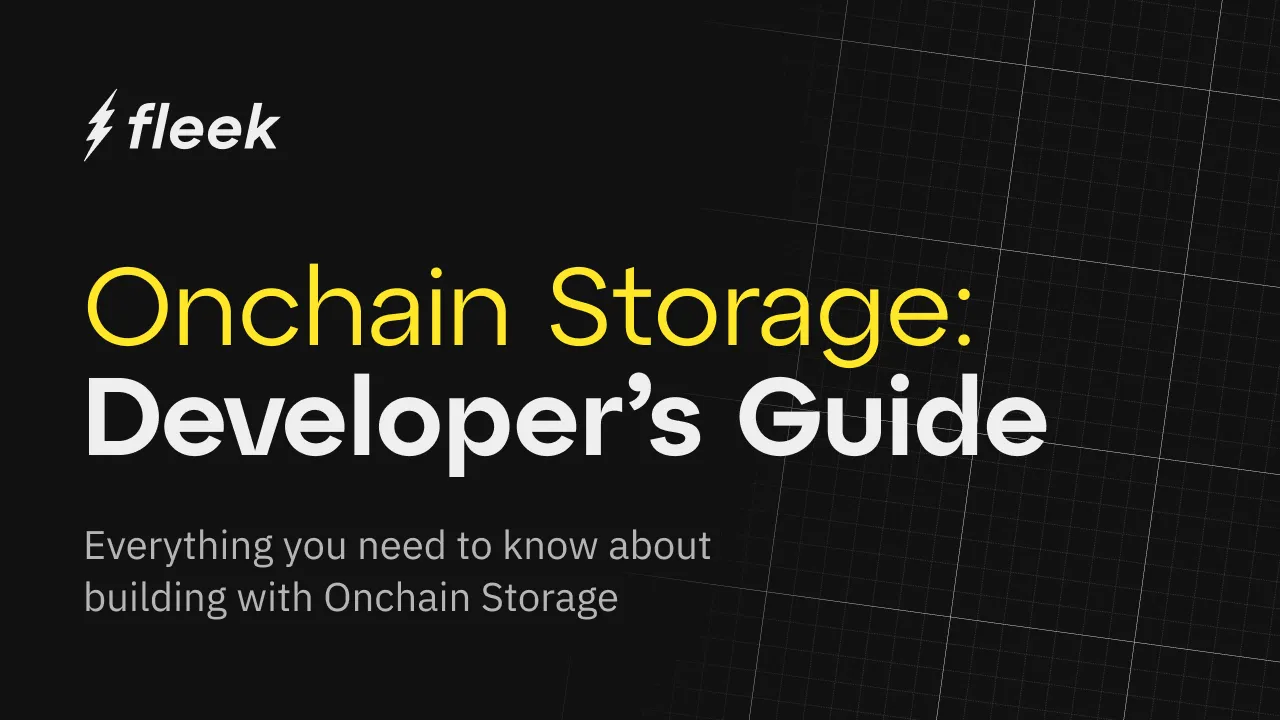Mass Adoption of Onchain Storage Hinges Solely on Developer Experience

Onchain storage diverges from the conventional, centralized server-based systems, typically opting instead for a distributed network of nodes to store data.
This shift not only eradicates the vulnerabilities and latency issues tied to centralized models but also challenges and dismantles existing power imbalances, offering enhanced privacy, security, uptime, and reliability.
Despite these considerable benefits, the adoption of Onchain storage solutions has been slower and less widespread than one might expect. A key factor hindering this adoption is the less-than-ideal developer experience offered by current technologies.
This blog post delves into the crucial challenges arising from these inadequate developer experiences, and how you can use Fleek to avoid the headaches that come with building with onchain storage solutions.
The problem with onchain storage solutions
Unlike familiar battle-test, centralized systems, onchain storage relies on a distributed network of devices. This shift means developers encounter complexities they wouldn’t face with traditional methods, which contributes to a steeper learning curve and a less familiar development experience.
- Lack of standardization
Standardization amongst onchain storage providers is quite absent, making it difficult for developers to integrate and adapt. The differences in interface, technology, and architecture of each onchain platform simply make it tough for developers to work with.
Furthermore, each onchain storage platform may have its own unique APIs, libraries, and tools, requiring developers to learn and adapt to multiple systems. This lack of standardization can lead to increased development time, higher costs, and compatibility issues.
Fleek helps developers bypass this steep technical curve and access a unified interface to store, host, and access onchain data.
- High barriers to entry
Before developers host and store data on onchain storage solutions, they ideally need to set up nodes and gateways to have complete control over their data. All this homework, on top of understanding the operational intricacies of onchain storage systems, is unnecessarily complex and time-consuming for developers.
This high barrier to entry deters developers from adopting onchain storage and hosting solutions.
Fleek tackles this issue by providing a seamless and intuitive platform that abstracts away the complexities of running or accessing nodes and gateways. With Fleek, developers can easily manage and access hosted data without having to pen code or any other manual labor.
- Fragmented developer experience
The onchain storage and hosting ecosystem is fragmented, with multiple platforms and solutions available, each with its own strengths and limitations. Not only does this make it difficult for developers to learn and work with these systems, but also creates a problem of choice that further increases complexities.
Rather than figuring out all these manually, developers can use Fleek which brings all these solutions under one roof. Fleek supports IPFS, Filecoin, and Arweave, helping developers bypass all the manual work, and directly — host, store, and access onchain data.
Fleek: Abstracting away the complexities
The developer experience while embracing onchain storage and hosting is a major letdown currently. However, all is not lost.
Here’s how Fleek simplifies the process of building and hosting applications and websites on onchain storage networks like IPFS (InterPlanetary File System).
- Host websites with just a few lines of code
Fleek helps developers host their websites, applications, and static content on onchain storage networks like IPFS, Filecoin, and Arweave with just a few lines of code. Developers just need to log in, connect their repository, configure their project, and deploy.
Also, Fleek offers IPFS pinning services that ensure the persistence and availability of content hosted on IPFS. It abstracts away the complexities of content replication and availability while facilitating data permanence.
- Use managed gateways instead of building from scratch
Gateways act as a bridge between the onchain storage network and the traditional web, enabling users to retrieve content using familiar URLs.
Developers can use Fleek’s gateways instead of setting and managing their gateways, saving time and resources. These gateways are also fast and give developers enough wiggle room to customize the gateways to their liking.
- Connect onchain domains without complication
The integration of domain names makes it more straightforward for users to access the content and websites.
Fleek has made connecting custom domains to content a simple process within the main interface itself. Developers need not even use CLIs or any other technicalities to connect their custom domains.
Developer experience drives mass adoption of onchain storage
Onchain storage continues to grow and gain adoption. But there’s a lot more left to be desired to bridge the gap between traditional web development and onchain storage solutions.
We can drive its mass adoption and unlock its full potential by making onchain storage easy to adopt, intuitive, and frictionless.
Onchain storage providers should also lead by example by offering resources and support on top of the tools to make this possible.
Developers can leverage Fleek’s SDK to access onchain storage solutions quickly and easily. You can learn more here.
FAQs
What are the main challenges developers face with onchain storage?
Developers encounter several challenges, including a lack of standardization across platforms, minimal debugging tools, sparse documentation, and portability issues when transitioning from centralized to onchain systems.
How can the developer experience be improved in onchain storage?
Improving the developer experience requires comprehensive tutorials, standardized tools and APIs, effective debugging and testing environments, and robust documentation and community support. Additionally, abstracting away the complexities of onchain technologies can make them more accessible to developers.
Are there any platforms that aim to simplify the developer experience for onchain storage?
Yes, platforms like Fleek are designed to simplify the developer experience by providing easy-to-use tools for hosting websites and applications on onchain networks, managing gateways, and connecting onchain domains with minimal technical complexity.